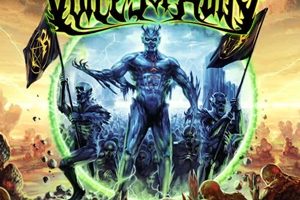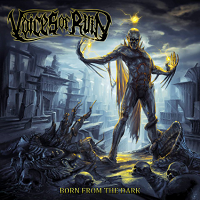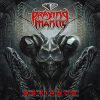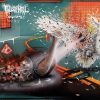Voices of Ruin – Seeking Immortality
Wednesday, 24th June 2020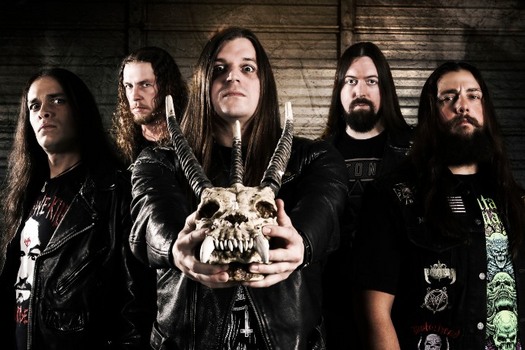
Blending melodic death metal with Scandinavian touches together against some traditional heavy metal and thrash nuances, Southern California’s Voices of Ruin have made quite an impression prior to signing with M-Theory Audio for their latest and third studio album Path to Immortality. Regional touring blossomed into European and Japanese tour escapades following the release of 2015’s Born from the Dark – gaining strength and seasoning for their live work and confidence to go into the studio to knock out the best effort possible.
Path to Immortality embraces tight compositions that feature stellar guitar volleys, memorable melodies, and attention to detail that hasn’t really been heard from an American melodic death metal act in quite some time. We reached out to vocalist Dave Barrett who was happy to give us insight into the band’s history, how working with Logan Mader as a producer brought even more out of the band than ever before, lessons learned and takeaways on overseas and domestic tours with Vader and Internal Bleeding, plus a lot of fond memories surrounding shows with In Flames, Destruction, and Wacken in these engaging conversation.
Dead Rhetoric: Path to Immortality is the third and latest Voices of Ruin album – stepping up to M-Theory Audio for a label after releasing your first two records independently. Where do you see the major differences for this record compared to the previous efforts – and what made going with a label like M-Theory Audio more attractive this go around?
Dave Barrett: We did a lot of writing as a full band for this record. We were able to focus as a unit, really put everything into it as far as the songwriting and the pre-production. With the material we had, we thought it was a good time to look at labels, get some good distribution. We thought the quality of the release was where we wanted it to be with a worldwide release with a good label. We have been in talks with Marco (Barbieri) at M-Theory Audio for about eighteen months prior to this record. We sent him the music, he really liked it, he agreed that it was something to work as a big release. The music stores unfortunately are closed, so we weren’t able to capitalize to get this in stores – but once everything opens up, we are hopeful to get this into music shops.
Their experience goes far beyond what we’ve been able to do with our two releases, which have been very successful on their own. Working with a label with their contacts, with their experience, their distribution, it’s been a great experience so far.
Dead Rhetoric: Ex-Machine Head/current Once Human guitarist Logan Mader produced the album. Where do you believe his seasoning and expertise helped the most to get the best performances and final product out of the band?
Barrett: You nailed it right there. His expectations were to the highest. He wanted each guitar attack to be well-timed, strong. Something we may not have had on previous releases. Each timing was huge- the less he needs to edit, and the more guitar stuff we can get on there without being edited is going to make for a better sound. His demand for each guitar note to be perfect really pushed us to have the best performance possible. Anywhere from the drums – we did the drums in a separate studio in Los Angeles, Under City Studios. His demand for perfection pushed us to the next level on the recording. He was great to work with – his experience as a guitar player getting guitar tones helped. We did a lot of pre-production, we recorded guitar, bass and vocals in eight full days. There wasn’t too much time for us to be messing around and missing parts.
I think you get a really good attack on the guitars on the record, and the vocals came out really well also. He was a kick ass guy, I’ve never seen anybody work so well when it comes to the equipment, he is a magician.
Dead Rhetoric: How did the idea come about to transform the Foo Fighters’ classic “Everlong” for this record?
Barrett: That’s a good one. When we get to the rehearsal studio, we always do things to warm up, drums and strings, vocals all have to warm up. We used to play random songs, and that one came up a lot. The timing of it, the sound of it, the melody. We rehearse twice a week, and we would jam that song. We thought about making it Voices of Ruin style, and putting it on the record. It turned out really cool, Tom did some cool things with some of the clean sections, the middle breakdown between the choruses turned out really cool. It’s got our own style, and maybe it could bridge us out to a different fanbase too. Some people may come across it and get exposed to give us a little bit more of a wider fanbase.
Dead Rhetoric: I enjoy the fact that you chose an outside the box cover, because a lot of heavier bands just choose to do a traditional metal classic and that’s not as much of a risk to make it their own…
Barrett: I don’t know if it’s a cover or a tribute – but it’s definitely got a different feel. I know Arsis in the past has done “Sunglasses at Night” from Corey Hart, and I thought that was cool. I agree with you, it’s definitely out of the box and hopefully will open some doors for people to listen to more extreme music.
Dead Rhetoric: Playing in a melodic death metal genre that’s probably best known for acts from Finland and Sweden especially, you definitely place a strong emphasis on solid melodic guitar hooks and circular refrains – as well as having a vocal presence that’s discernible even through the screams and growls. How do you approach the development of your songwriting – are there core elements that have to be there to make a Voices of Ruin song complete?
Barrett: It’s always weird being labeled melodic death metal. We did that to ourselves as well – we are huge fans of the genre and we have influences from the Scandinavian scene. Some of our songs have a thrash element to them too. I think as we’ve developed musically we’ve been able to… mature a lot. We put elements in together that make sense. It’s tough to be a melodic death metal band, especially in southern California where the demand for thrash and death metal is high. We have a following here and in Europe – we provide those thrash and death elements that can build an audience.
We’ve grown musically into that. We get the riffs together, Tom writes the songs, we fill it in with our parts, the drums, the bass, the vocals. And it comes together – it’s our influences that push things out.
Dead Rhetoric: How do you think the touring you did in 2017-2018 across Japan and Europe has strengthened the band chemistry and outlook on your live performances? Did you gain any takeaways from some of the veteran acts you supported like Vader, Internal Bleeding, and Hate?
Barrett: Big time. Those guys have extensive histories – Vader being one of the pioneers of death metal, Internal Bleeding creating slam, we learned a lot from those guys. They are all great dudes, open to talking and sharing their experience and their wisdom. For professionalism we learned a lot. We’ve done a lot of local touring since 2009, and we learned a lot from them as far as timing, how to show up on time, staged and ready to go with warm-ups. That’s the money maker right now, our live performance, and selling merch to our fans and gaining exposure. We took all the performances seriously, no matter the size of the crowds.
Vader taught us a lot, but we did a little more with Internal Bleeding because we did a European tour and we were on the same bus with them – so we were able to talk a little more extensively and learn a lot of experience. I learned to be more professional on stage. We got a lot of exposure out of all those tours. I recommend all the younger bands that are fortunate enough to tour with these experienced bands and get on tour, talk to them, learn from them, watch their performances night after night. The first Vader tour as a vocalist, I was nervous to do 36 days in a row – including us going to meet Vader and us coming home, because the tour started on the East Coast. I had never sung that many days in a row and was worried about blowing my voice out, I talked to them about their routine as well as Sacrificial Slaughter, they’ve done extensive touring as well. That was my big takeaway, learning how to take care of my voice and balance things out on the road.
Dead Rhetoric: Over the past six years you developed your own Ruinfest that celebrates the California extreme metal scene. How did the idea sprout up and how important has it been to cultivate a strong local scene to then develop some international acclaim?
Barrett: That’s our baby, our festival. We take care pride in that festival and showcasing bands. We did a show locally here, my brother and I are in Costa Mesa now – we put a bunch of bands on it, and we just wanted a strong show. There was Voices of Ruins, and Sacred Ruins – we were talking about it after the show about creating a Ruinfest. Let’s make it something big – we talked to some local promoters like Jason from ADHD, we got a venue and called it Ruinfest. All the local bands were onboard, it wasn’t a money grab and we are just trying to get more exposure for the scene. Put them in a platform where we could get a good headliner and get some exposure for these great, hard working bands including ourselves. We’ve taken it to the next level, we have a twenty by ten foot banner, we street team and have flyers everywhere, do all the booking ourselves. We’ve had Fallujah on there, we’ve had Exmortus, we had a really big Los Angeles band called Draconis, it was their last show they headlined for us. We hope we can get some more international bands and create it to be a festival we could do on a bigger stage – Knotfest style festival in the winter. With the weather still being nice.
We want to get bands with a buzz for our Southern California scene. One thing we try to do is to get a solid headliner, but build as many genres as possible around that. That’s what helps tighten the community, not just having one genre. Metal is already one huge family, we love that festival.
Dead Rhetoric: What are you views on the state of heavy metal in the United States versus the global scale? What improvements (if any) need to be made?
Barrett: Genre hating is a problem within the US. There’s not enough diversity and appreciation, and that’s a personal opinion. You go to some of the festivals in Europe, there may be a band (in the lineup) that’s not all death metal. You go to Wacken there are German punk bands there, and at Hellfest they have a diverse lineup. Taking more of that kind of approach, enjoying it instead of breaking it down and hating it. There’s so much analyzing it and criticizing it, but putting hate on it we need to improve upon. Appreciate the musicianship, the songwriting, all the work that goes into it.
I know the financing is a part of it too. In a lot of European nations, bands can get grants and financing to support the musicians – and not just mainstream music. Even in melodic death metal. We could do a better job of supporting music, supporting musicians, supporting the elite talent in the industry. Promoting it, that’s the biggest takeaway.
Dead Rhetoric: If you had the opportunity to teach a high school or college level course outside of your metal/music industry comfort zone, what would you consider developing as a course and why do you think that subject matter needs to be taught?
Barrett: Wow, that’s a tough question! Outside of metal you said. My most interesting subjects, history and what we can learn from it and how we can grow from it. It could be applied everywhere, and business as well. Those are my two things I like to look up the most and know about the most to teach upon. I’ve never been asked a question like that.
Dead Rhetoric: Your first live metal show was in 1999 with In Flames on the Colony tour. Can you discuss the impression they made upon you at that time – and what have been some of your other favorite concert memories purely as a fan?
Barrett: Man, I remember that concert like it was yesterday. (laughs). The show, my brother took me in this beat up Mercury Cougar. It was our dad’s car. My first show at the Whisky. I had never experienced anything like that, everybody together loving the music. It seemed like it wasn’t a fashion show, everyone was there to listen to the bands. The moshpit was going and the music really captured me. In Flames, they have such a great sound, the melodies, all the songs. They encored with “Episode 666”, to hear that song live was amazing. Especially with my brother too. I think that really brought us together and brought me into the extreme scene as opposed to some of the mainstream metal.
Other shows that really stuck out. We saw Destruction at the Key Club, that was one of the most chaotic shows I’ve ever seen. I couldn’t believe that. We played with Insomnium, after our set watching them was a memorable performance. Their live sound is so amazing. The first time seeing Slayer – 2006, on the 666 show they did Long Beach Arena. The biggest pit I’ve ever seen. And of course going to Wacken – we went in 2010 and did that. That festival is kick ass amazing.
Dead Rhetoric: What do you think are the biggest learning lessons you’ve had with Voices of Ruin since the start of the band?
Barrett: Recording-wise and pre-production, we’ve learned so much from that first album. When you put things down, you realize the material needs a lot of polishing and changes that have to be made on the fly. Pre-production is our biggest thing that we learned to take more time and put more effort into. I think it really reflects on the new record. Songwriting, taking and picking which songs work and which songs don’t is a big learning experience for us. The equipment too- we’ve upgraded all of our equipment, the live equipment especially. We’ve always been a live band, and we take pride in our live experiences and being able to give the fans something that they don’t expect. We continue with that, upped our equipment and stage gear. And being more professional – at first we were partiers. Don’t get me wrong, we still like to party, but taking the music and the performances more seriously. And we want to be able to open things up more and get out there a little more.
Dead Rhetoric: How would you describe the support you receive from friends, family, and significant others when it comes to the band? As I imagine it has to be a tough balancing act trying to build things up, while also working full-time jobs, and carve out some time for relationships…?
Barrett: It’s been a battle. We are lucky with Tom and myself, our father has been a big supporter of us. He’s always supported us musically, he bought Tom his first guitar. Family-wise we’ve been very fortunate. Our relationships have had ups and downs, going on the road – especially with work as you’ve said it’s been a balancing act. We balance our time wisely. We carve out time twice a week to do rehearsals, and Tom and I live together so that can help with the writing. We delegate all of our responsibilities within the band so no one person is overloaded and unable to balance it. We’d like to take this to a new level and make this our top priority, and we treat it that way and that’s helped us grow and evolve as a band. But it is a balancing act, time management is huge. We’ve all had longevity at our jobs, so they all understand what we are doing.
Standing out in each aspect and making yourself valuable, in our work especially and growing as a band has helped us grow. We have support from all of our friends, and our family. The music video we recently did, a good friend of ours helped us do that. Our drummer’s girlfriend, helped us big time with that. We are grateful for that.
Dead Rhetoric: What’s on the agenda for Voices of Ruin over the next twelve months to support this release? Are you hopeful to get another recording, either an EP or album, out before your normal five-year curve between releases?
Barrett: That’s the goal. We hope to shorten that time frame, big time. Regardless of the current state, we want to shorten that. We have some new songs in the pipeline that we are working on. We definitely want to have another release before that five-year mark, hopefully within the next two to two and a half years. We want something out by 2022. We want to really support this record over the next eighteen months to two years on the road. We feel this material really translates really well live.
The biggest thing for us is to do a US tour – the last one we did was in 2017, we were able to go to Europe and Japan in 2018. We have a lot of fans asking for us in Florida, Texas, and on the East Coast. Europe – I don’t know how things will be with the COVID panic for traveling overseas. We want to hit Scandinavia, we’ve grown more since this record. Go back to Japan. The biggest thing is tour and support for this album, we have some new stage gear. We did a lot in the rehearsal room. We got on that five-year timeline accidentally, we didn’t do that on purpose at all. We think this is a great record, we are fans of the music and we’ve always taken that step. We can’t wait to play it live, to fans who have and haven’t seen us. We want everyone to be safe, but as soon as things open up, we are ready to hit the road.
Voices of Ruin official website











